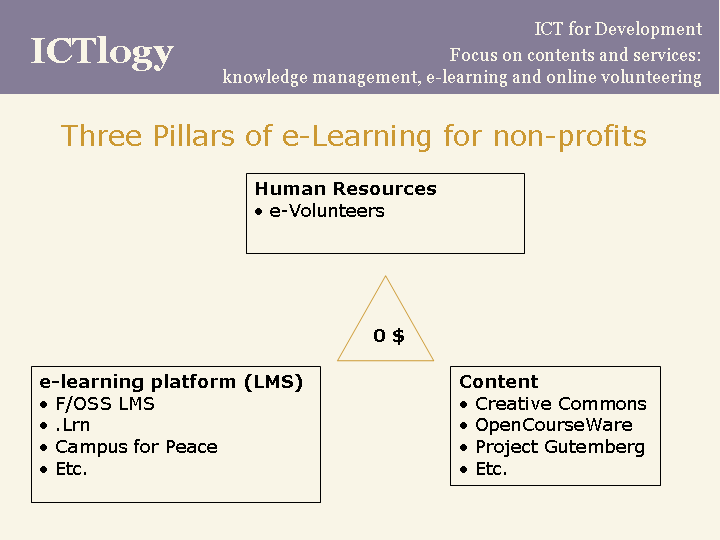By Ismael Peña-López (@ictlogist), 16 November 2004
Main categories: ICT4D
5 Comments »
Rebeca MacKinnon at RConversation:
socially conscious members of the blogging community (of all political persuasions) might want to organize a “Blogger Corps.” Through it, bloggers could donate their time to help poorly funded activists or non-profit groups to figure out what blogging tools are right for them, set up blogs, and develop effective blogging strategies
Nancy White at Full Circle Associates:
Do we need a Blogger Corps? Or do we need to continue to do a bit more overtly what already happens: help each other. Post short cuts and tips. Welcome each other. Point people to free resources. Read and comment on new bloggers’ blogs as a form of coaching and encouragement.
Working in the NPO/NGO community, I get a bit jaded about yet another group. Maybe we need to simply plug into existing groups? On the flip side, creating a service identity in the blogosphere has value as well.
In my opinion, there’s no need to create this specific volunteers group but add, in some other online volunteering sites, a new category related to blog coaching. And foster and foster online volunteering, besides if it develops web sites or designs online learning content.
By Ismael Peña-López (@ictlogist), 15 November 2004
Main categories: Education & e-Learning
1 Comment »
Online Learning Environments is a list of links gathered by Tereça Almeida.
Not related with ICT4D or this ICT4D blog, but I thought I might want to look for it sometime later… and this is the best place that came in mind to store it ;)
[via OLDaily]
By Ismael Peña-López (@ictlogist), 15 November 2004
Main categories: ICT4D
No Comments »
A report published by The Communication Initiative, by Warren Feek of The Communication Initiative with substantial support and guidance from Greg Long.
Focused in ICT4D in Health but it looks quite a good reading – very busy these days, just had time to have a quick look at its table of contents.
 The Current and Future Applications of Information and Communication Technologies for Developmental Health Priorities (2,60 Mb)
The Current and Future Applications of Information and Communication Technologies for Developmental Health Priorities (2,60 Mb)
[via incommunicado]
By Ismael Peña-López (@ictlogist), 15 November 2004
Main categories: ICT4D
2 Comments »
I don’t fancy talking about bloging, the blogosphere and so – I think it’s quite endogamic.
Nevertheless, I liked this couple of links:
- A list of nonprofit blogs at Omydar, started by Marnie Webb, but, as a wiki, updatable by anyone – I added ICTlogy there ;)
- A post by Rebecca MacKinnon called Blogging for change where she promises to build also a list of nonprofit blogs
[Everything via Extension 337]
By Ismael Peña-López (@ictlogist), 10 November 2004
Main categories: Education & e-Learning, ICT4D, Writings
1 Comment »
This is something I talked about three months ago and then uploaded in my articles section an article about e-learning for nonprofits, based on F/OSS e-learning platforms, free (licensed) content and virtual volunteers. Unfortunately, at least for some of you ;), it was only in Spanish.
Still having to find the time to translate it, I did find the time to put it in a simple image.
The question is that, simplifying to the maximum, an e-learning course for nonprofits – and for whoever – can be done with three main pillars or pieces of the puzzle, and that these pieces can be at zero cost:

[click to enlarge image]
If you can’t read the image, the pieces are:
Human Resources
e-Volunteers
e-learning platform (LMS)
F/OSS LMS
.Lrn
Campus for Peace
Etc.
Content
Creative Commons
OpenCourseWare
Project Gutenberg
Etc.
Not very elaborated, but wasn’t I supposed to keep it simple? :P
By Ismael Peña-López (@ictlogist), 10 November 2004
Main categories: Education & e-Learning, Meetings
No Comments »
Last Friday I was speaking at the Quality in the Third Sector Seminar but also attended the whole event.
In her speech, Manuela Pérez, manager of the Quality and Productivity Program of the CIDEM said:
“Training is not education: training is teaching someone how to do some things but not telling him why”
I had never looked at it that way… Thus, I think we should educate more than train people, specially those less developed…

 The Current and Future Applications of Information and Communication Technologies for Developmental Health Priorities
The Current and Future Applications of Information and Communication Technologies for Developmental Health Priorities
